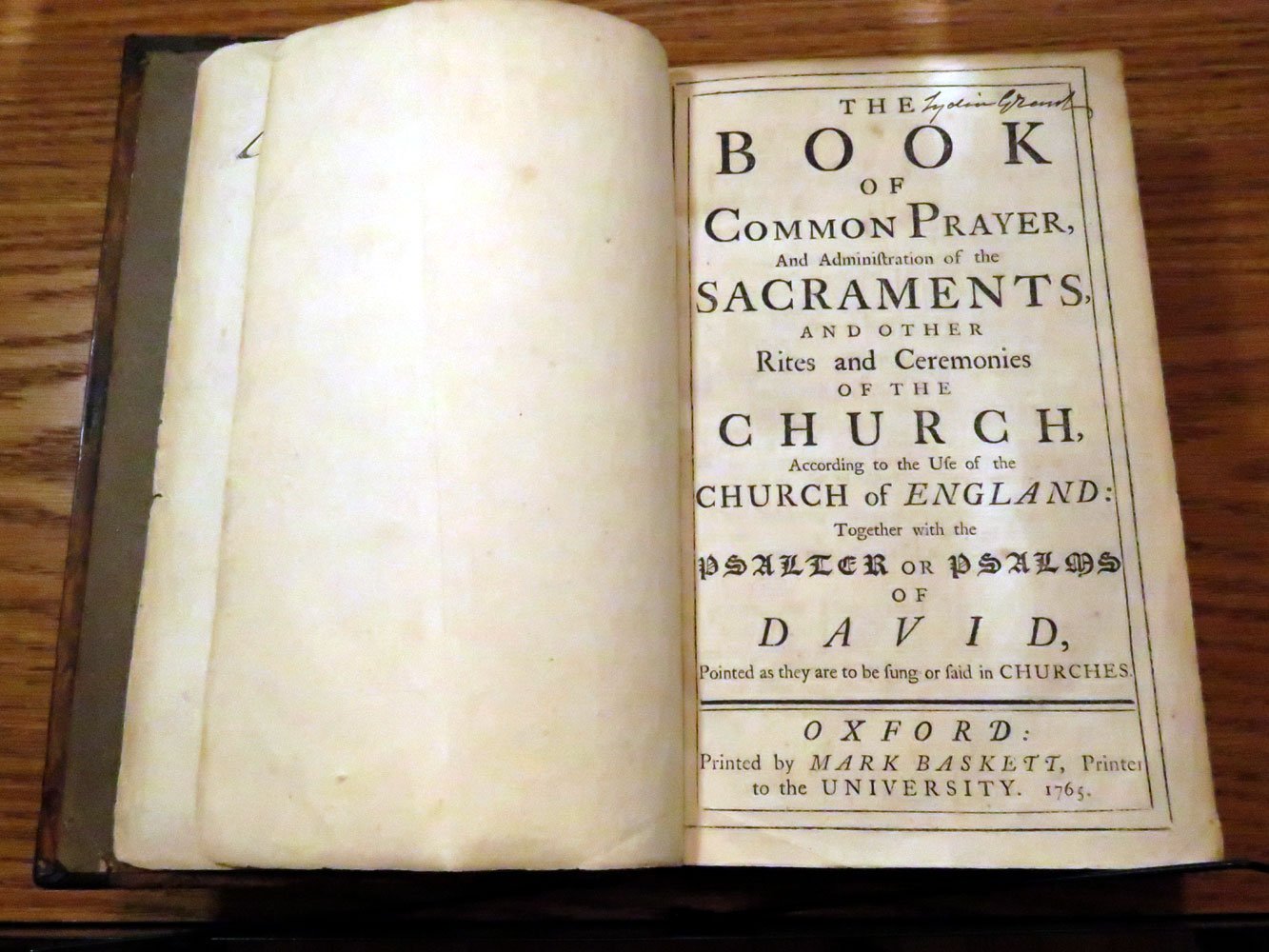The Development of the Book of Common Prayer.

The Book of Common Prayer is a collection of liturgical texts and prayers used in the Anglican Church. It has been in use since the 16th century and has gone through several revisions over the centuries. The first version was compiled by Thomas Cranmer, the Archbishop of Canterbury, in 1549. This version was based on the liturgical practices of the Church of England and was intended to replace the Latin liturgy that had been used in the Church of England since the Middle Ages. The 1549 version of the Book of Common Prayer was widely accepted and used in the Church of England until the reign of Queen Elizabeth I.
In 1552, a revised version of the Book of Common Prayer was issued. This version was more Protestant in its theology and was intended to further distance the Church of England from the Roman Catholic Church. This version was also more detailed than the 1549 version and included additional prayers and services.
In 1604, a new version of the Book of Common Prayer was issued. This version was more conservative in its theology and was intended to bring the Church of England closer to the Roman Catholic Church. This version was also more detailed than the 1552 version and included additional prayers and services.
In 1662, a revised version of the Book of Common Prayer was issued. This version was more Protestant in its theology and was intended to further distance the Church of England from the Roman Catholic Church. This version was also more detailed than the 1604 version and included additional prayers and services.
The 1662 version of the Book of Common Prayer has remained in use in the Church of England since that time. It has been revised several times over the centuries, but the basic structure and content of the book has remained largely unchanged.
The Book of Common Prayer has had a profound influence on the Anglican Church and on the English language. Its language and structure have been adopted by many other churches and its prayers and services have been used in many different contexts. The Book of Common Prayer is an important part of Anglican history and continues to be used in the Church of England today.
The Impact of the Book of Common Prayer on the Anglican Church

The Book of Common Prayer (BCP) has had a profound impact on the Anglican Church since its first publication in 1549. The BCP was an immediate success, and it quickly became the standard liturgy of the Church of England. It was also adopted by other Protestant churches, such as the Church of Scotland and the Church of Ireland. The BCP was revised several times over the centuries, but its core elements remained largely unchanged.
The BCP has also had a lasting impact on the Anglican Church. It has shaped the way Anglicans worship, and it has provided a common language for prayer and liturgy. The BCP has also been influential in the development of Anglican theology, as it contains many of the core beliefs of the Church.
The BCP has also been a source of unity for Anglicans. It has provided a common language and liturgy that has allowed Anglicans from different countries and cultures to come together in worship. This has been especially important in the modern era, as Anglicans have become increasingly diverse.
The BCP has been an integral part of the Anglican Church for centuries, and its influence can still be seen today. It has provided a common language for prayer and liturgy, and it has shaped the way Anglicans worship. It has also been a source of unity for Anglicans, allowing them to come together in worship despite their differences. The BCP has had a profound impact on the Anglican Church, and it will continue to do so for many years to come.
Use of the Book of Common Prayer in Different Countries

In the United Kingdom, the Book of Common Prayer is an integral part of the Anglican Church. It is used in all services, from baptisms to funerals, and is a source of spiritual guidance for many. The book has been revised several times over the centuries, with the most recent version being published in 2019.
In the United States, the Book of Common Prayer is used in many Episcopal churches. It is also used in some other Protestant denominations, such as the United Church of Christ and the Presbyterian Church (USA). The book has been revised several times since its first publication in 1789, with the most recent version being published in 1979.
In Canada, the Book of Common Prayer is used in the Anglican Church of Canada. It is also used in some other Protestant denominations, such as the United Church of Canada and the Presbyterian Church in Canada. The book has been revised several times since its first publication in 1892, with the most recent version being published in 1962.
In Australia, the Book of Common Prayer is used in the Anglican Church of Australia. It is also used in some other Protestant denominations, such as the Uniting Church in Australia and the Presbyterian Church of Australia. The book has been revised several times since its first publication in 1836, with the most recent version being published in 1995.
In New Zealand, the Book of Common Prayer is used in the Anglican Church in Aotearoa, New Zealand and Polynesia. It is also used in some other Protestant denominations, such as the Presbyterian Church of Aotearoa New Zealand and the Methodist Church of New Zealand. The book has been revised several times since its first publication in 1854, with the most recent version being published in 1989.
The Book of Common Prayer has been an important part of the spiritual life of many countries around the world for centuries. Its influence can be seen in the liturgies of many churches, and its importance in the spiritual lives of many people cannot be overstated.
Shaping English Language and Literature

The Book of Common Prayer (BCP) contains a wealth of language that has been used in English literature for centuries. Its language is often poetic and lyrical, and its structure and cadence have been adopted by many writers. The BCP has been a source of inspiration for many authors, including William Shakespeare, John Milton, and T.S. Eliot. Its influence can be seen in the works of these authors, as well as in the works of many others.
The BCP also has a significant influence on the structure and form of English literature. Its language has been used to create a variety of literary styles. The BCP has been used to create a variety of genres, including the sonnet, the ode, and the hymn. This influence can be seen in the works of many authors, including John Donne, George Herbert, John Dryden, William Wordsworth, Samuel Taylor Coleridge, and Alfred Lord Tennyson.
The Influence of the Book of Common Prayer on Church Tradition

The BCP has had a significant influence on Protestant liturgy. Its structure and language have been adopted by many Protestant denominations, including the Lutheran Church, the Presbyterian Church, and the Methodist Church. The BCP’s structure is based on the ancient liturgies of the early Church, and its language is both poetic and accessible. This has enabled it to be adopted by a wide range of Protestant denominations, who have adapted it to suit their own particular needs.
The BCP has also had a major influence on Protestant theology. Its emphasis on the importance of Scripture, its emphasis on the importance of personal faith, and its emphasis on the importance of prayer have all been adopted by many Protestant denominations. The BCP’s emphasis on the importance of Scripture has been particularly influential, as it has encouraged Protestants to read and study the Bible in order to gain a deeper understanding of their faith.
Finally, the BCP has had a major influence on the way in which Protestantism is practiced. Its emphasis on the importance of communal worship has encouraged Protestants to gather together in churches and other places of worship to share in the celebration of the Eucharist and other liturgical practices. This has helped to create a sense of unity and community among Protestants, and has enabled them to share their faith. The BCP’s influence on other church tradition is undeniable, and its impact will continue to be felt for many years to come.
Some of the Books of Common Prayer that we have in stock.
-
 1781 & 1782 Octavo Book Of Common Prayer & Psalms Printed by W. Jackson and and A. Hamilton , Oxford$199.99
1781 & 1782 Octavo Book Of Common Prayer & Psalms Printed by W. Jackson and and A. Hamilton , Oxford$199.99 -
 1772 Octavo Book Of Common Prayer Printed by T. Wright & W. Gill, Oxford *Binding$249.99
1772 Octavo Book Of Common Prayer Printed by T. Wright & W. Gill, Oxford *Binding$249.99 -
 1765 Quarto Book Of Common Prayer Printed by MARK BASKETT, Oxford$299.99
1765 Quarto Book Of Common Prayer Printed by MARK BASKETT, Oxford$299.99 -
 1700 Book of Common Prayer – London Charles Bill & Newcomb FOLIO, RED RULED engraved frontis by Loggan$499.99
1700 Book of Common Prayer – London Charles Bill & Newcomb FOLIO, RED RULED engraved frontis by Loggan$499.99 -
 1730 FOLIO Book of Common Prayer w/ Psalter by the Assigns of His Majesty’s Printer Henry Hills Bible$399.99
1730 FOLIO Book of Common Prayer w/ Psalter by the Assigns of His Majesty’s Printer Henry Hills Bible$399.99 -
 1618 Book of Common Prayer, Psalter & Book of Psalms printed by Bonham Norton and John Bill – Rare Early$699.99
1618 Book of Common Prayer, Psalter & Book of Psalms printed by Bonham Norton and John Bill – Rare Early$699.99

Comments closed



























